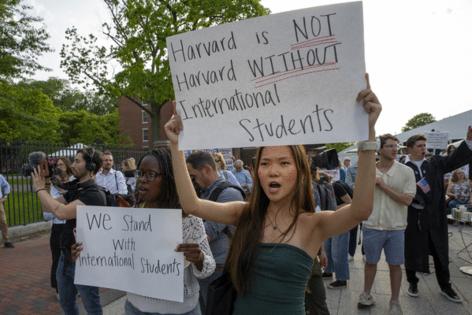Judge issues rebuke of 'bullying' Trump in free speech case
Published in Political News
The Trump administration’s crackdown on foreign students and academics violated the First Amendment by targeting them for expressing their political views, a federal judge ruled in an unusual opinion that broadly and sharply criticized President Donald Trump.
U.S. District Judge William G. Young in Boston said that noncitizens have the same First Amendment rights as Americans. Young, who presided over a trial in July, said the case “squarely presents the issue whether noncitizens lawfully present here in United States actually have the same free speech rights as the rest of us” Young said.
“The Court answers this Constitutional question unequivocally ‘yes, they do,’” Young said.
The suit, filed in March by a pair of education groups, argued the administration engaged in “ideological deportation” by canceling the visas of legal residents who engaged in campus activism. It was the first trial challenging the government’s authority to deport foreign students who protested the war in Gaza.
The 161-page ruling is a departure from how opinions are usually written. The judge blasted Trump’s immigration policies in a highly critical opinion, which begins with “Trump has pardons and tanks ... What do you have?” scrawled across the top of the court document, above the case title, taken from an anonymous postcard sent to the judge in June.
Spokespeople at the White House and at the U.S. Department of Homeland Security didn’t immediately return emails seeking comment about the ruling.
In the opinion, Young said that Secretary of Homeland Security Kristi Noem and Secretary of State Marco Rubio and their subordinates acted together “to misuse the sweeping powers” of their offices to target pro-Palestinian noncitizens “primarily on account of the First Amendment protected political speech.” They did so to “strike fear” into other noncitizens backing Palestinian rights.
“The effect of these targeted deportation proceedings continues unconstitutionally to chill freedom of speech to this day,” wrote Young, who was appointed by Ronald Reagan in 1985.
The judge followed his ruling with a 13-page section titled “JUSTICE IN THE TRUMP ERA,” in which the judge is sharply critical of Trump’s actions in office. Young begins by quoting his wife: “He seems to be winning. He ignores everything and keeps bullying ahead.”
‘Behold President Trump’s Successes’
“Behold President Trump’s successes in limiting free speech — law firms cower, institutional leaders in higher education meekly appease the President, media outlets from huge conglomerates to small niche magazines mind the bottom line rather than the ethics of journalism,” the 85-year-old Young wrote.
Young characterized Trump’s manner of speech as “triumphal, transactional, imperative, bellicose, and coarse.”
“It seeks to persuade — not through marshaling data driven evidence, science, or moral suasion, but through power,” he wrote.
The judgment is a setback for the administration, which argued that Congress granted the Secretary of State the authority to revoke visas and green cards using a rarely used provision of the Immigration and Nationality Act.
The U.S. argued the law allows the government to deport individuals based on speech and it has the authority to remove an individual who undermines foreign policy interests. The American Association of University Professors and the Middle East Studies Association, which filed the suit, argued the administration chilled the speech and activities of thousands of noncitizen scholars.
Andrew Crespo, a Harvard Law School professor and general counsel to the AAUP’s Harvard faculty chapter, said that he had “never seen an opinion like this one, authored by a Republican-appointed judge with 40 years of experience on the bench.”
‘Wake-up call’
“It is a wake-up call to every American about the dire authoritarian threats facing our nation, and the need for all citizens to stand up for our core constitutional rights, including the bedrock right to speak out when our government threatens our liberties,” he added.
While government lawyers denied the plaintiffs’ theory that the government had engaged in a practice of “ideological deportation policy,” Young cited statements by Rubio about the students including calling them “lunatics” and “glorified terrorists.”
He called the actions of Rubio and Noem “more invidious” than any ideological deportation saying, “to target a few for speaking out and then use the full rigor of the Immigration and Nationality Act (in ways it had never been used before) to have them publicly deported with the goal of tamping down pro-Palestinian student protests and terrorizing similarly situated non-citizen (and other) pro-Palestinians into silence because their views were unwelcome.”
Young, who presided over a two-week trial without a jury in July, will now have to craft a remedy as part of the second phase of the case.
Citing Trump’s calls for retribution against his critics, Young said “it will not do simply to order the public officials to cease and desist in the future. The harm here and the deprivation suffered runs far deeper.”
But Young acknowledged that Trump’s speech can’t be constrained and that any solution should not interfere with the ability of public officials to enforce the law.
Young turned to a quote from Reagan, who appointed him to the bench. “Freedom is a fragile thing and it’s never more than one generation away from extinction,” Reagan said.
“I fear President Trump believes the American people are so divided that today they will not stand up, fight for, and defend our most precious constitutional values so long as they are lulled into thinking their own personal interests are not affected.” Young wrote at the end of the opinion, concluding: “Is he correct?”
The case is AAUP et al v. Marco Rubio, 25-cv-10685US District Court for the District of Massachusetts (Boston)
_____
©2025 Bloomberg L.P. Visit bloomberg.com. Distributed by Tribune Content Agency, LLC.
























































Comments